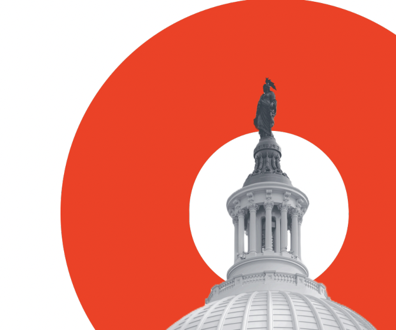
Douglas Litchfield/Shutterstock.com
Is Trump’s Plan to Privatize Air-Traffic Control a Good Idea?
It might occasionally make flying a smoother experience. But it also might hurt smaller airports.
“Broken,” “horrible,” “antiquated.” Those are some of the words President Trump recently used to describe the nation’s current air-traffic control system. That system is currently managed by the Federal Aviation Administration (FAA), a government agency that oversees all aspects of commercial aviation.
Trump’s solution? Transfer some of the FAA’s responsibilities to a private nonprofit organization. This would take nearly two-thirds of its workforce—including thousands of technicians and over 13,000 air-traffic controllers—off the government payroll. The newly formed entity would then be responsible for directing planes both on the ground and in the air. (Trump’s plan isn’t complete privatization, but rather more like a public-private partnership, as the FAA would continue to oversee the air-traffic-control system.)
The idea isn’t new. Talk of privatizing the management of the nation’s skies dates back three decades. In 1987, President Ronald Reagan’s Commission on Privatization identified air-traffic control as ripe for outsourcing. The idea failed to pick up steam then, but the Trump administration is hoping for a different outcome this time around.
Talk of privatization has raised several questions: Why privatize at all? Will it make flying safer? How will airports across the country be affected? There are actually good cases to make both for and against privatization. On the whole, reforming how air-traffic services are delivered is worthwhile—but not without costs, and those costs are important to understand and address.
One of Trump’s stated arguments for his plan is that it will make flying safer, but this is fairly flimsy reasoning. Opponents rightly point out that flying is as safe as it’s ever been: Tens of thousands of flights take to the skies every day across America and they (almost always) land without incident. The last fatal crash of a U.S. passenger plane was in 2009. Since then, the nation’s commercial accident record has been spotless.
Further, airplanes today are designed differently compared to decades prior, and their safety record has less to do with air-traffic control’s governance structure and more to do with how modern planes are manufactured. For example, improvements in propulsion mechanics mean that engines fail far less than they used to. And structural-engineering advances mean that corrosion of planes’ bodies no longer forces them out of the sky.
Another argument for privatization, one that has more merit, has to do with how the air-traffic control system gets its funding. The FAA is largely supported by fees collected from passengers, and taxes are imposed on everything from tickets to frequent-flyer miles to jet fuel. While the revenue collected is deposited into a trust fund, its use must be approved by Congress. This model can subject the agency to the ill effects of political gridlock. One example of this that gets brought up often is the partial government shutdown of 2013. In the fall of that year, thousands of FAA workers (including some in safety-sensitive positions) were furloughed, affecting the agency’s ability to complete its mission. Privatization would avert a scenario like this because funds would flow directly from passengers and airlines to the air-traffic service provider.
Privatizing a portion of the FAA would also, according to some, make the agency as a whole more nimble. The FAA has proven itself slow at adopting new technologies, often relying on antiquated systems from a bygone era, including World War II-era radar and spotty radios that link controllers on the ground to pilots in the air. Newer systems are available, but slow-moving bureaucracy often makes these systems obsolete by the time they are acquired (if they happen to be acquired at all).
But privatizing air-traffic control would come with some downsides too. For one thing, a private entity providing critical air-traffic services would necessarily be considered too big to fail. This means taxpayers could potentially be on the hook to bail out that entity—in the name of safety—should it go under.
Trump’s privatization plans also concern small airports, which might see their interests overlooked by a new organization that reports to businessmen rather than elected officials. Specifically, these regional airports are worried that privatization would encourage, rather than reverse, the worrying trend of decreased service to smaller markets. This trend has to do with the airline industry’s economics: Small airports cater to small communities and this ultimately means fewer fare-paying passengers. The airplanes best suited for these markets are regional jets with up to 100 seats. But these jets are also, on a per-passenger basis, between 40 and 60 percent less fuel-efficient than bigger passenger planes, which matters tremendously in an industry with such slim profit margins and high fuel costs. This explains why major U.S. carriers have scaled back flights to rural communities, preferring instead to service larger, more revenue-rich locations. Communities with small airports worry that privatizing a substantial part of the regulatory body of the aviation industry will make this trend worse.
Another issue here is what Lawrence Krauter, the chief executive of Spokane International Airport, a medium-size airport in Washington state, calls the “commoditization of services.” Krauter worries that with a corporation at the helm, the best technical and human resources will be assigned to the busiest airports simply because those airports generate the most revenue. Smaller airports will be, he fears, left behind. The White House, for its part, argues otherwise—the president has said his plan will “maintain support for rural communities and small airports”—but some leaders of small airports such as Krauter aren’t convinced. (Nor are some Republican lawmakers.)
While these issues—air-traffic control’s vulnerability to political gridlock and the needs of small airports—are the real ones at stake, how one feels about privatization also likely has to do with one’s political philosophy. Some view air-traffic control as a public service, one that should remain within the purview of elected government officials rather than airline executives who answer to shareholders. Others see it as outside the jurisdiction of government, and privatizing the system resonates with those concerned about the national debt. They argue that taking air-traffic workers off the government ledger would help rein in public spending. (Of course, regardless of who employs these workers, they will still need to be paid, and the money for that will come from passengers, one way or another.)
It’s not clear which political philosophy will win out in this case. Trump’s proposal requires congressional approval and some lawmakers have already come out against it. The corporate-and-charter-jet lobby also opposes privatization, fearing it will raise the cost of flying for its members. The same goes for the aviation community more generally, most of whose interests are represented by the powerful Aircraft Owners and Pilots Association.
Interestingly, privatization does have some support from air-traffic controllers themselves. The labor union representing the nation’s 13,000-plus controllers says it looks forward to reviewing the legislation, though it emphasized its higher priority remains “protecting the rights and benefits of the [air-traffic control] workforce.”
The U.S. wouldn’t be the first country to privatize air-traffic control. Over 60 countries have done so to date. Canada is perhaps the best example of how a shift in air-traffic governance can benefit the flying public. Since privatizing air-traffic control in 1996, operating costs have fallen, labor relations have improved, and the government has been freed from what was then a loss-making enterprise. If America proceeds carefully, it could see the same.






